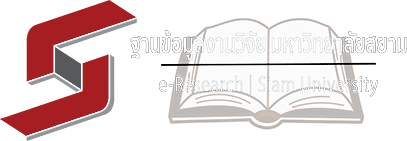- KB Home
- หลักสูตรระดับบัณฑิตศึกษา|Graduate Schools
- หลักสูตรปริญญาเอก|Doctoral Degree
- Ph.D. Ed
- แนวทางการพัฒนาภาวะผู้นำเชิงนวัตกรรมของผู้บริหารสถานศึกษา สังกัดสำนักงานเขตพื้นที่การศึกษามัธยมศึกษากรุงเทพมหานคร
| หัวข้อวิทยานิพนธ์: Project Title: |
แนวทางการพัฒนาภาวะผู้นำเชิงนวัตกรรมของผู้บริหารสถานศึกษา สังกัดสำนักงานเขตพื้นที่การศึกษามัธยมศึกษากรุงเทพมหานคร Guidelines for the innovative leadership development of school administrators under the Bangkok Secondary Education Service Area Office |
| ชื่อนักศึกษา: Author: |
นางนภาพร ศรีสุคันธพฤกษ์ Mrs. Napaporn Srisukanthapuek |
| อาจารย์ที่ปรึกษา: Advisor: |
รองศาสตราจารย์ ดร.จอมพงศ์ มงคลวนิช, ผู้ช่วยศาสตราจารย์ ดร.ปองสิน วิเศษศิริ Assoc. Prof. Dr. Jomphong Mongkhonvanit, Asst. Prof. Dr. Pongsin Viseshsiri |
| ระดับการศึกษา: Degree: |
ปรัชญาดุษฎีบัณฑิต (ปร.ด.) Doctor of Philosophy |
| สาขาวิชา: Major: |
ภาวะผู้นำและนวัตกรรมการบริหารการศึกษา Leadership and Innovation in Educational Administration |
| คณะ: Faculty: |
บัณฑิตวิทยาลัย Graduate Schools |
| ปีการศึกษา: Academic year: |
2566 2023 |
| Published/แหล่งเผยแพร่: |
วารสารสังคมศาสตร์และวัฒนธรรม ปีที่ 7 ฉบับที่ 3 (มีนาคม 2566) หน้า 117-131 | Journal of Social Science and Cultural Vol. 7 No. 3 (2023): March 2023 https://so06.tci-thaijo.org/index.php/JSC/article/view/262254?fbclid=IwAR3M3VTx7p5CPFhoVKnVimG6FCgNVDHmh25_3INpIMuw9C_0os8pNIa2MbM |
การอ้างอิง|Citation
นภาพร ศรีสุคันธพฤกษ์. (2566). แนวทางการพัฒนาภาวะผู้นำเชิงนวัตกรรมของผู้บริหารสถานศึกษา สังกัดสำนักงานเขตพื้นที่การศึกษามัธยมศึกษากรุงเทพมหานคร. (วิทยานิพนธ์ปรัชญาดุษฎีบัณฑิต). กรุงเทพฯ: บัณฑิตวิทยาลัย มหาวิทยาลัยสยาม.
Srisukanthapuek N. (2023). Guidelines for the innovative leadership development of school administrators under the Bangkok Secondary Education Service Area Office. (Doctoral dissertation). Bangkok: Doctor of Philosophy in Leadership and Innovation in Educational Administration, Siam University
บทคัดย่อ
การวิจัยครั้งนี้มีวัตถุประสงค์ เพื่อ 1) ศึกษาสภาพปัจจุบันและสภาพที่พึงประสงค์ของภาวะผู้นำเชิงนวัตกรรมของผู้บริหารสถานศึกษา สังกัดสำนักงานเขตพื้นที่การศึกษามัธยมศึกษากรุงเทพมหานคร และ 2) นำเสนอแนวทางการพัฒนาภาวะผู้นำเชิงนวัตกรรมของผู้บริหารสถานศึกษา สังกัดสำนักงานเขตพื้นที่การศึกษามัธยมศึกษากรุงเทพมหานคร เก็บข้อมูลจากกลุ่มตัวอย่าง ซึ่งเป็น ผู้บริหารสถานศึกษา จำนวน119 คน รองผู้บริหารสถานศึกษาฝ่ายวิชาการ จำนวน119 คน และครูที่รับผิดชอบด้านเทคโนโลยีของโรงเรียน จำนวน119 คน รวมทั้งสิ้น 357 คน เลือกมากลุ่มตัวอย่างละ1 คน จากทั้งหมด 119 โรงเรียน โดยใช้วิธีเลือกแบบเจาะจง (Purposive Sampling) เครื่องมือที่ใช้ในการเก็บข้อมูลเป็นแบบสอบถามแบบมาตราส่วนประมาณค่า 5 ระดับ โดยมีค่าความเชื่อมั่นของเครื่องมือในสภาพปัจจุบัน เท่ากับ 0.98 และค่าความเชื่อมั่นของเครื่องมือในสภาพที่พึงประสงค์ เท่ากับ 0.99 การวิเคราะห์ข้อมูลเชิงปริมาณ ใช้ค่าสถิติ ค่าร้อยละ (Percentage) ค่าความถี่ (Frequency) ค่าเฉลี่ย (Mean) ส่วนเบี่ยงเบนมาตรฐาน (S.D.) และในการจัดลำดับดรรชนีความต้องการจำเป็น (PNI) แล้วนำมายกร่างเป็นแนวทางการพัฒนาภาวะผู้นำเชิงนวัตกรรมของผู้บริหารสถานศึกษา สังกัดสำนักงานเขตพื้นที่การศึกษามัธยมศึกษากรุงเทพมหานคร โดยการสัมภาษณ์ผู้ทรงคุณวุฒิ จำนวน 17 คน แบ่งเป็น 2 กลุ่ม คือ 2.1 ผู้บริหารสถานศึกษาที่ได้รับรางวัลทรงคุณค่า สพฐ. OBEC AWARDS ประจำปีการศึกษา 2563 ด้านนวัตกรรมและเทคโนโลยีเพื่อการเรียนการสอน จำนวน 7 คน 2.2 ผู้ที่เกี่ยวข้องทางการศึกษาและนักวิชาการ จำนวน 10 คน เพื่อประเมินตรวจสอบความเหมาะสม ให้ข้อแนะนำเพิ่มเติม และความเป็นไปได้ในการนำร่างแนวทางการพัฒนาภาวะผู้นำเชิงนวัตกรรมของผู้บริหารสถานศึกษาไปใช้ และดำเนินการสนทนากลุ่ม (Focus Group) โดยเชิญผู้ทรงคุณวุฒิ จำนวน 8 คน ซึ่งเป็นผู้ที่มีความรู้และประสบการณ์ในการบริหารสถานศึกษา เป็นนักวิชาการที่มีส่วนเกี่ยวข้องกับการพัฒนานวัตกรรมทางการศึกษา
ผลการวิจัย พบว่า 1) สภาพปัจจุบันและสภาพที่พึงประสงค์ในภาพรวมค่าเฉลี่ยของสภาพปัจจุบันอยู่ในระดับ “มาก” เมื่อพิจารณาค่าเฉลี่ยสภาพที่พึงประสงค์ในรายด้านอยู่ในระดับ “มากที่สุด” ทุกด้าน ผลการจัดลำดับความสำคัญของความต้องการจำเป็นในการพัฒนาภาวะผู้นำเชิงนวัตกรรมของผู้บริหารสถานศึกษา สังกัดสำนักงานเขตพื้นที่การศึกษามัธยมศึกษากรุงเทพมหานคร มีการสังเคราะห์ภาวะผู้นำเชิงนวัตกรรม 8 องค์ประกอบ โดยเรียงลำดับจากมากไปหาน้อย ได้แก่ การมีวิสัยทัศน์การเปลี่ยนแปลง การทำงานเป็นทีมและการมีส่วนร่วม การสร้างแรงจูงใจ การคิดสร้างสรรค์ การสร้างบรรยากาศองค์กร การบริหารความเสี่ยง การสร้างเครือข่ายและสายสัมพันธ์ การใช้เทคโนโลยีสารสนเทศและการสื่อสาร ตามลำดับ 2) แนวทางการพัฒนาภาวะผู้นำเชิงนวัตกรรมของผู้บริหารสถานศึกษา สังกัดสำนักงานเขตพื้นที่การศึกษามัธยมศึกษากรุงเทพมหานคร จำแนกตามความต้องการจำเป็นสูงสุดในแต่ละด้าน พบว่า 2.1) ผู้บริหารสถานศึกษาและบุคลากรทุกคนจะต้องมีการตั้งเป้าหมายความสำเร็จ มองเห็นภาพอนาคตของสถานศึกษาในสถานการณ์ที่เปลี่ยนแปลง มุ่งมั่น ตั้งใจพัฒนาองค์กร และมีความเชื่อมโยงกับนโยบายของต้นสังกัด 2.2) ผู้บริหารสถานศึกษาจะต้องมีการกำหนดแนวทางหรือมาตรการรองรับในสถานการณ์ต่างๆ เพื่อลดความเสี่ยงและความเสียหายที่จะเกิดขึ้นในอนาคต 2.3) ผู้บริหารสถานศึกษาและบุคลากรทุกคนจะต้องร่วมมือร่วมใจและบูรณาการจากหลายๆ ฝ่าย เสนอความคิดเห็นเพื่อร่วมแก้ปัญหาผลการดำเนินการร่วมกัน 2.4) ผู้บริหารสถานศึกษามีการสร้างความสัมพันธ์ที่ดี มีความจริงใจเอาใจใส่ให้การสนับสนุนบุคลากรอย่างเสมอภาคเท่าเทียมกัน 2.5) ผู้บริหารสถานศึกษาจัดสิ่งอำนวยความสะดวกและสภาพแวดล้อม เพื่อให้ครูและบุคลากรปฏิบัติงานสร้างสรรค์ผลงานด้านนวัตกรรมให้ประสบผลสำเร็จ 2.6) ผู้บริหารสถานศึกษาจะต้องวิเคราะห์หน่วยงานที่ประสบผลสำเร็จมีการนำแนวคิดและวิธีการรูปแบบเดิมมาพัฒนาต่อยอด สร้างแนวคิดใหม่ๆ ในการขับเคลื่อนให้เกิดการสร้างนวัตกรรมใหม่ที่มีคุณค่ามากขึ้น 2.7) ผู้บริหารสถานศึกษามีการปรับปรุงพัฒนาระบบเครือข่ายและส่งเสริมพัฒนานวัตกรรมให้มีประสิทธิภาพอย่างต่อเนื่อง 2.8) ผู้บริหารสถานศึกษาพัฒนาคุณภาพเทคโนโลยีสารสนเทศและการสื่อสารให้มีความทันสมัยทันต่อความก้าวหน้าทางเทคโนโลยีในยุคปัจจุบันเพื่อนำไปสู่การสร้างสรรค์นวัตกรรมในสถานศึกษา
คำสำคัญ : แนวทางการพัฒนา, ภาวะผู้นำเชิงนวัตกรรม, ผู้บริหารสถานศึกษา, มัธยมศึกษา
Abstract
The objectives of this study are 1) to study the current and desirable conditions of the guidelines for the innovative leadership development of school administrators under the Bangkok Secondary Education Service Area Office and 2) to propose the guidelines for the innovative leadership development of school administrators under the Bangkok Secondary Education Service Area Office. The samples used in this study consisted of a total of 357, including 119 school administrators, 119 deputy administrators of Academic Affairs, and 119 teachers who are responsible for school technology. They were selected from each sample group of 119 schools. The research instrument used in the data collection was five-point Likert scale questionnaire with a dual-response format. The reliability of current condition of this instrument was 0.98 and its reliability of desirable condition was 0.99. The statistics used in the data analysis were percentage, frequency, mean and standard deviation. The Modified Priority Needs Index (PNI modified) was then used to draft the guidelines for the innovative leadership development of school administrators under the Bangkok Secondary Education Service Area Office. By interviewing luminaries. There are 17 students divided into two groups : 2.1 Award-winning school administrators; 2020 Academic Year’s Obec Awards for Innovation and Technology for Teaching and Learning – 7 person. 2.2 Academic and academic peers 10 students were assessed for suitability, provided additional recommendations, and the feasibility of innovative leadership development guidelines of school administrations and conducting group discussions, inviting luminaries. Eight of them, who have knowledge and experience in school administration, are academics involved in the development of educational innovations.
The results showed that 1) In overall, the average needs in the current condition were at a high level, while the average needs in the desirable condition were at a highest level in all aspects. Regarding the needs for the innovative leadership development of school administrators under the Bangkok Secondary Education Service Area Office, a synthesis of 8 elements of innovative leadership can be prioritized in descending order as follows: Transformational vision, teamwork and participation, incentives, creativity, corporate culture, risk management, networks and relationships, information and communication technology, respectively; 2) As for the guidelines for the innovative leadership development of school administrators under the Bangkok Secondary Education Service Area Office classified by to the highest needs in each area, it was found that 2.1) the school administrators and all personnel must set goals for success, foresee the future of the school in changing situations and focus on organizational development and the goals must be consistent with the policies of the original affiliation; 2.2) the school administrators must determine the guidelines or measures for reducing risk and damage in possible future situations; 2.3) the school administrators and all personnel must work together and cooperate with many parties in order to achieve a solution to the problem of joint performance; 2.4) the school administrators must be sincere, caring, have a good relationship with personnel and provide equal support to personnel; 2.5) the school administrators must provide facilities and good environments for the success in the creation of innovative works of teachers and personnel; 2.6) the school administrators should analyze the practices of the successful departments and apply existing concepts and methods for further development and promotion of new ideas and creation of new and more valuable innovations; 2.7) the school administrators must constantly improve and develop the network systems and promote improvements in efficiency of innovation development; and 2.8) the school administrators must improve the quality of information and communication technology to keep up with the current technological advancement in order to lead to innovations in educational institutions.
Keyword: Development guidelines, Innovative leadership, School administrator, Secondary education.
แนวทางการพัฒนาภาวะผู้นำเชิงนวัตกรรมของผู้บริหารสถานศึกษา สังกัดสำนักงานเขตพื้นที่การศึกษามัธยมศึกษากรุงเทพมหานคร|Guidelines for the innovative leadership development of school administrators under the Bangkok Secondary Education Service Area Office
Doctor of Philosophy in Leadership and Innovation in Educational Administration, Siam University, Thailand


